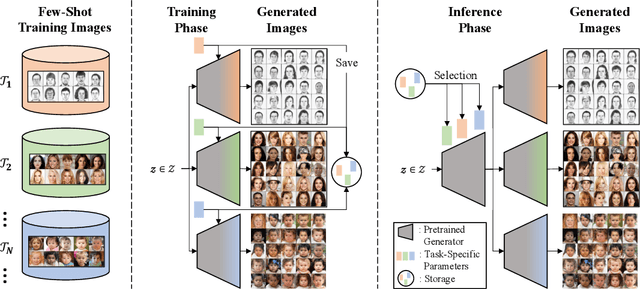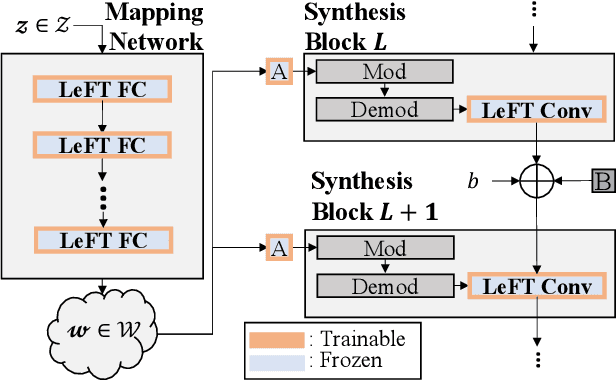Juwon Seo
ConceptSplit: Decoupled Multi-Concept Personalization of Diffusion Models via Token-wise Adaptation and Attention Disentanglement
Oct 06, 2025Abstract:In recent years, multi-concept personalization for text-to-image (T2I) diffusion models to represent several subjects in an image has gained much more attention. The main challenge of this task is "concept mixing", where multiple learned concepts interfere or blend undesirably in the output image. To address this issue, in this paper, we present ConceptSplit, a novel framework to split the individual concepts through training and inference. Our framework comprises two key components. First, we introduce Token-wise Value Adaptation (ToVA), a merging-free training method that focuses exclusively on adapting the value projection in cross-attention. Based on our empirical analysis, we found that modifying the key projection, a common approach in existing methods, can disrupt the attention mechanism and lead to concept mixing. Second, we propose Latent Optimization for Disentangled Attention (LODA), which alleviates attention entanglement during inference by optimizing the input latent. Through extensive qualitative and quantitative experiments, we demonstrate that ConceptSplit achieves robust multi-concept personalization, mitigating unintended concept interference. Code is available at https://github.com/KU-VGI/ConceptSplit
Generative Unlearning for Any Identity
May 16, 2024



Abstract:Recent advances in generative models trained on large-scale datasets have made it possible to synthesize high-quality samples across various domains. Moreover, the emergence of strong inversion networks enables not only a reconstruction of real-world images but also the modification of attributes through various editing methods. However, in certain domains related to privacy issues, e.g., human faces, advanced generative models along with strong inversion methods can lead to potential misuses. In this paper, we propose an essential yet under-explored task called generative identity unlearning, which steers the model not to generate an image of a specific identity. In the generative identity unlearning, we target the following objectives: (i) preventing the generation of images with a certain identity, and (ii) preserving the overall quality of the generative model. To satisfy these goals, we propose a novel framework, Generative Unlearning for Any Identity (GUIDE), which prevents the reconstruction of a specific identity by unlearning the generator with only a single image. GUIDE consists of two parts: (i) finding a target point for optimization that un-identifies the source latent code and (ii) novel loss functions that facilitate the unlearning procedure while less affecting the learned distribution. Our extensive experiments demonstrate that our proposed method achieves state-of-the-art performance in the generative machine unlearning task. The code is available at https://github.com/KHU-AGI/GUIDE.
LFS-GAN: Lifelong Few-Shot Image Generation
Sep 05, 2023



Abstract:We address a challenging lifelong few-shot image generation task for the first time. In this situation, a generative model learns a sequence of tasks using only a few samples per task. Consequently, the learned model encounters both catastrophic forgetting and overfitting problems at a time. Existing studies on lifelong GANs have proposed modulation-based methods to prevent catastrophic forgetting. However, they require considerable additional parameters and cannot generate high-fidelity and diverse images from limited data. On the other hand, the existing few-shot GANs suffer from severe catastrophic forgetting when learning multiple tasks. To alleviate these issues, we propose a framework called Lifelong Few-Shot GAN (LFS-GAN) that can generate high-quality and diverse images in lifelong few-shot image generation task. Our proposed framework learns each task using an efficient task-specific modulator - Learnable Factorized Tensor (LeFT). LeFT is rank-constrained and has a rich representation ability due to its unique reconstruction technique. Furthermore, we propose a novel mode seeking loss to improve the diversity of our model in low-data circumstances. Extensive experiments demonstrate that the proposed LFS-GAN can generate high-fidelity and diverse images without any forgetting and mode collapse in various domains, achieving state-of-the-art in lifelong few-shot image generation task. Surprisingly, we find that our LFS-GAN even outperforms the existing few-shot GANs in the few-shot image generation task. The code is available at Github.
 Add to Chrome
Add to Chrome Add to Firefox
Add to Firefox Add to Edge
Add to Edge